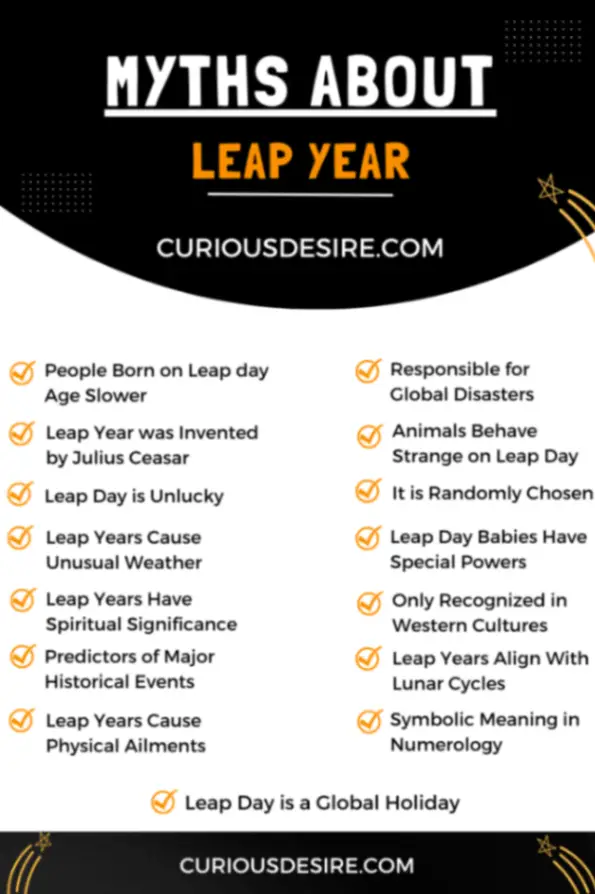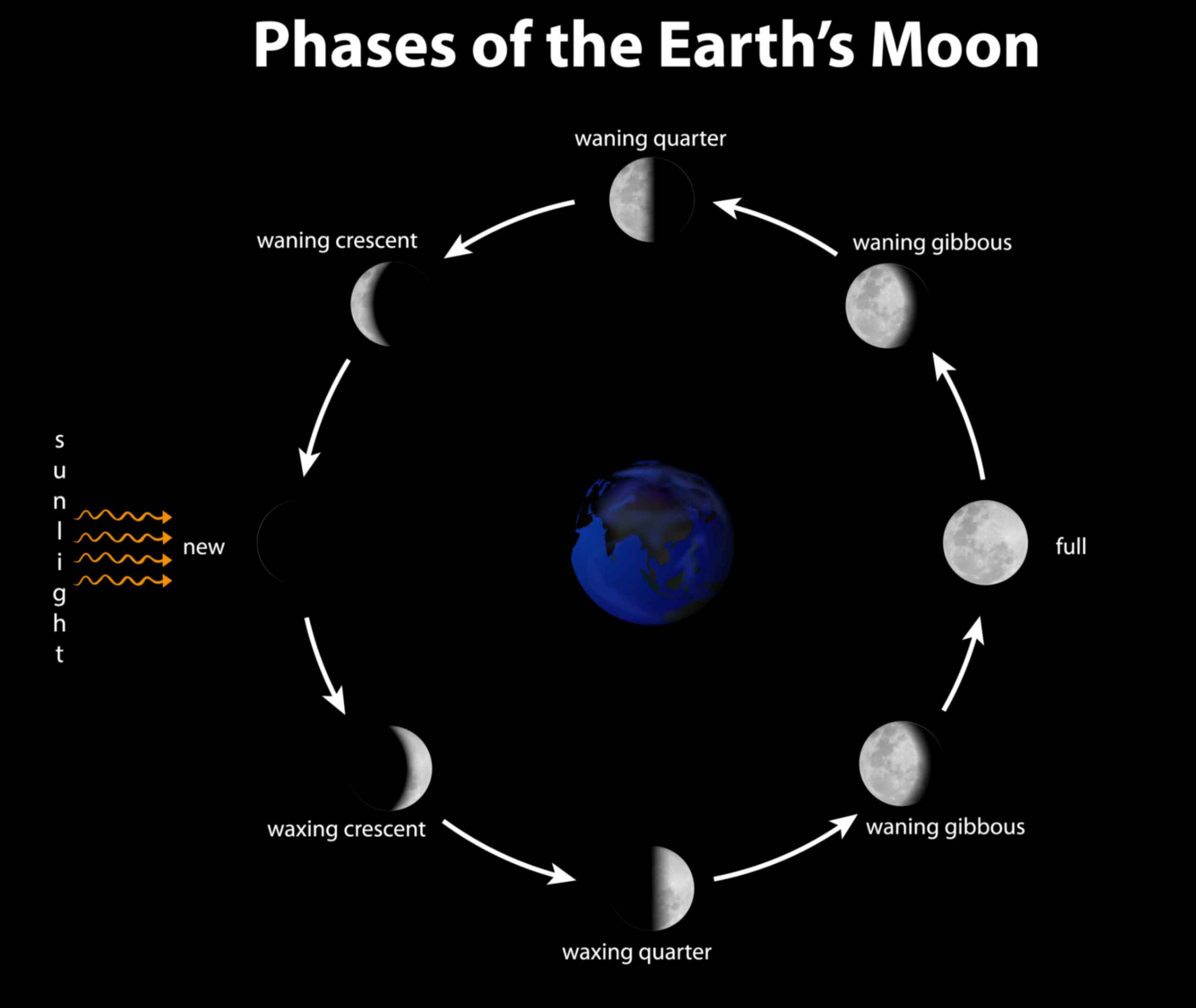Every four years, we have an extra day added to the calendar – February 29th, known as Leap Day.
This additional day is necessary to keep our modern-day Gregorian calendar in alignment with the Earth’s orbit around the sun.
However, over the years, several myths and misconceptions have surrounded Leap Year.
From ancient legends to modern-day superstitions, Leap Year has sparked a plethora of tales, both captivating and confounding
In this blog, we will debunk some of the most common myths about Leap Year and shed light on the truth behind this fascinating calendar anomaly.
5 most common myths about leap year:
- People Born on Leap Day Age Slower
- Leap Years Cause Unusual Weather Patterns
- Leap Years Are Predictors of Economic Downturns
- Leap Years Align with Lunar Cycles
- Leap Day is a Global Holiday

Myth 1. People Born on Leap Day Age Slower
One of the most popular myths about Leap Year is that individuals born on February 29th (Leap Day) age at a slower rate than those born on other days.
This misconception likely stems from the rarity of Leap Day birthdays, making them appear special and unique.
However, Leap Day babies age and celebrate their birthdays just like everyone else.
They may only get to celebrate on the exact day of their birth once every four years, but they still age at the same rate as the rest of the population.
Myth 2: Leap Year Is Responsible for Global Disasters and Misfortunes
Some people believe that Leap Year brings bad luck and is responsible for global disasters or misfortunes.
This myth has its roots in superstitions and unfounded beliefs about the calendar.
In reality, Leap Year is a natural occurrence necessary to align our calendar with the Earth’s orbit.
There is no scientific evidence to suggest that Leap Year has any influence on the occurrence of disasters or misfortunes.
Myth 3: Leap Day is Unlucky
The belief that leap day is unlucky is a superstition without any scientific basis.
Leap day is merely an additional day added to our calendar every four years to account for the Earth’s orbit around the sun.
The concept of luck is subjective and varies across cultures.
While some may associate leap day with superstitions or negative omens, there’s no empirical evidence to support such beliefs.
It’s essential to recognize that luck is a psychological construct rather than an inherent quality of a specific day on the calendar.
Leap Day should be celebrated like any other day, devoid of any undue superstitions or fears.
Myth 4: The Leap Year Was Invented by Julius Caesar
Contrary to popular belief, leap years predate Julius Caesar’s calendar reforms.
The idea of adding an extra day to the calendar to synchronize it with the solar year has roots in ancient civilizations like the Egyptians and Babylonians.
Julius Caesar’s reform in 45 BCE, which introduced the Julian calendar, refined existing systems but did not invent the concept of leap years.
Leap years are a product of centuries of astronomical observations and mathematical calculations aimed at maintaining calendar accuracy.
While Caesar’s reforms played a role in standardizing the leap year cycle, they were not the origin of the concept.
Myth 5: Leap Day is Randomly Chosen
Leap day is not randomly chosen but is strategically added to our calendar system to align it with the Earth’s orbit around the sun.
The Gregorian calendar, the most widely used calendar system today, follows a specific set of rules to determine leap years.
According to these rules, a year is a leap year if divisible by 4, except for years divisible by 100 but not by 400.
This adjustment ensures that our calendar remains synchronized with the astronomical seasons.
Far from being arbitrary, leap day serves a crucial function in maintaining calendar accuracy and preventing seasonal drift.
Myth 6: Animals Behave Strangely on Leap Day
The notion that animals behave strangely on leap day is purely speculative and lacks scientific evidence.
Animal behavior is influenced by various factors such as environmental conditions, biological rhythms, and social interactions, rather than human-imposed calendar systems.
While folklore and superstitions may attribute special significance to Leap Day, there’s no empirical basis to suggest that animals exhibit unusual behavior on this day.
It’s essential to rely on scientific observation and research rather than unsubstantiated beliefs when understanding animal behavior.
Leap day should be regarded as just another day in the calendar, with no inherent influence on the behavior of animals.

Myth 7: Leap Years Cause Unusual Weather Patterns
There is no scientific evidence to suggest that leap years have any influence on weather patterns.
Weather phenomena are primarily driven by complex atmospheric and meteorological factors, including temperature differentials, air pressure systems, and ocean currents.
Leap years, which are merely adjustments to our calendar system to synchronize it with the Earth’s orbit around the sun, have no direct correlation with atmospheric conditions.
Weather patterns vary independently of leap years, and attributing unusual weather events to calendar anomalies is a misconception.
Myth 8: Leap Day Babies Have Special Powers or Characteristics
The notion that individuals born on Leap Day possess special powers or characteristics is a myth devoid of scientific validity.
Birthdate alone does not determine a person’s abilities, personality traits, or inherent qualities.
Leap day babies, like individuals born on any other day of the year, exhibit a diverse range of talents, interests, and traits shaped by genetic, environmental, and social factors.
While being born on leap day may hold personal significance for some individuals, it does not confer them with supernatural powers or unique attributes.
Myth 9: Leap Years Are Predictors of Economic Downturns
There is no empirical evidence to support the claim that leap years serve as predictors of economic downturns.
Economic fluctuations are influenced by a multitude of complex factors, including fiscal policies, market trends, geopolitical events, and consumer behavior.
Leap years, which are calendrical adjustments aimed at maintaining synchronization with the Earth’s orbit, play no causal role in economic cycles.
Attempting to correlate leap years with economic downturns is a fallacious interpretation based on coincidental occurrences rather than causal relationships.
Myth 10: Leap Years Have Spiritual Significance
While leap years may hold cultural or traditional significance in certain belief systems, attributing spiritual or metaphysical meaning to them is subjective and varies across cultures.
Leap years are primarily a product of astronomical calculations and calendar adjustments designed to reconcile the discrepancies between the solar year and the calendar year.
Any spiritual significance associated with leap years is rooted in cultural interpretations rather than objective reality.
It’s essential to differentiate between cultural beliefs and scientific principles when considering the significance of leap years in spiritual contexts.
Myth 11: Leap Years Are Obsolete in Modern Times
Leap years are as vital today as they were in ancient times.
The Gregorian calendar, the most widely used calendar system worldwide, incorporates leap years to ensure that our calendar remains synchronized with the Earth’s orbit around the sun.
Without leap years, our calendar would gradually drift out of alignment with the solar year, leading to seasonal discrepancies.
In modern society, precise timekeeping is essential for various purposes, including scheduling events, coordinating international activities, and conducting scientific research.
Leap years play a crucial role in maintaining the accuracy of our calendar system, ensuring that dates correspond correctly with the changing seasons.
Myth 12: Leap Years are Only Recognized in Western Cultures
Leap years are not exclusive to Western cultures but are recognized and accounted for in various calendar systems worldwide.
While the Gregorian calendar, used predominantly in Western societies, incorporates leap years, other cultures have their methods of adjusting calendars to synchronize with astronomical phenomena.
- For example, the Islamic calendar follows a lunar system but has leap years to ensure alignment with solar events.
- Similarly, other cultures in Asia and the Middle East have their calendar systems that incorporate adjustments for leap years.
Leap years are a universal phenomenon acknowledged across diverse cultures, each with its own customs and traditions.
Myth 13: Leap Years Are Predictors of Major Historical Events
There is no causal relationship between leap years and major historical events.
Historical occurrences are influenced by a myriad of complex social, political, economic, and environmental factors, rather than the occurrence of leap years.
While leap years may coincide with significant events due to their regular occurrence every four years, they do not serve as predictors or determinants of historical events.
Any correlation between leap years and historical events is coincidental rather than causal.
Myth 14: Leap Day is Excluded from Legal Documents or Contracts
Leap day is treated like any other day in legal documents and contracts, with specific provisions made to address its occurrence in leap years.
Legal systems and contract law account for leap years by either recognizing February 29th as a valid date or adjusting contractual terms to accommodate the additional day in leap years.
Courts and legal authorities recognize leap day as a legitimate day for legal purposes, and contracts executed on February 29th are legally binding.
The notion that leap day is excluded from legal documents is a misconception that overlooks the practical measures in place to address its occurrence in leap years.
Myth 15: Leap Years Align with Lunar Cycles
Leap years are based on adjustments to the solar calendar to synchronize it with the Earth’s orbit around the sun, rather than lunar cycles.
While lunar calendars exist and are used in various cultures, they operate on different principles from solar calendars.
Leap years are a feature of solar calendars like the Gregorian calendar, which divides the year into months based on the Earth’s orbit around the sun.
Lunar calendars, on the other hand, are based on the phases of the moon and do not incorporate leap years in the same manner as solar calendars.
The alignment of leap years with lunar cycles is coincidental rather than intentional, as leap years reconcile the solar calendar with astronomical events rather than lunar phases.

Myth 16: Leap Years Cause Chaos in Timekeeping
Leap years are precisely calculated adjustments designed to maintain temporal order and alignment with astronomical phenomena.
Rather than causing chaos, leap years ensure that our calendar remains synchronized with the Earth’s orbit around the sun.
The rules governing leap years are well-established and have been in use for centuries to prevent timekeeping discrepancies.
While adjustments may be necessary periodically to account for minute inaccuracies, leap years are essential for maintaining calendar accuracy, rather than causing chaos in timekeeping.
Myth 17: Leap Years Cause Physical Ailments or Illnesses
There is no scientific evidence to suggest that leap years cause physical ailments or illnesses.
Health is influenced by a multitude of factors, including genetics, lifestyle, environment, and access to healthcare, none of which are affected by the occurrence of leap years.
The notion that leap years have any bearing on human health is unfounded and falls into superstition rather than scientific fact.
Myth 18: Leap Day is a Global Holiday
Leap Day is not recognized as a global holiday.
While some cultures may celebrate Leap Year with special events or traditions, Leap Day is not universally observed as a public holiday.
In most countries, February 29th is treated like any other day, with businesses, schools, and government offices operating as usual.
While leap years may hold cultural significance in certain regions, a leap day is not a globally recognized holiday on par with traditional public holidays.
Myth 19: Leap Years Have Symbolic Meaning in Numerology
Any symbolic meaning associated with leap years in numerology is purely speculative and not based on empirical evidence.
Numerology is a belief system that assigns mystical significance to numbers, but the interpretation of such symbolism is subjective and varies among practitioners.
While some may attribute symbolic meanings to leap years based on numerological principles, such interpretations lack scientific validity and should be viewed with skepticism.
Myth 20: Leap Years Will Eventually Be Eliminated
Leap years are unlikely to be eliminated as long as we continue to use the Gregorian calendar or similar systems that rely on leap years to maintain accuracy.
The rules governing leap years have proven effective in synchronizing our calendar with astronomical events and preventing seasonal drift over centuries.
While alternative calendar systems have been proposed, none have gained widespread acceptance or replaced the Gregorian calendar.
As such, leap years are likely to remain an integral part of our calendar system for the foreseeable future.
Source: BreakingOne YT Channel
Conclusion
Leap Year is a fascinating aspect of the calendar that has sparked various myths and misconceptions over the years.
By debunking these common myths about Leap Year, we can better understand the significance and meaning behind this calendar anomaly.
While Leap Year may have its quirks and traditions, it is important to separate fact from fiction and appreciate the science and history that underlie this fascinating phenomenon.
So the next time Leap Year rolls around, remember that it’s not a day to fear or superstition but a moment to marvel at the intricacies of our calendar system and the wonders of timekeeping.
Myths About Leap Year FAQs
1. How often does a leap year occur?
Leap years occur every four years, except for years divisible by 100, unless they are also divisible by 400.
2. Does a leap year have any significance beyond adding an extra day?
In some cultures and traditions, leap years are associated with superstitions, folklore, and special customs.
3. How many days are there in a leap year?
A leap year has 366 days instead of the usual 365, with the extra day added in February.
4. Do all cultures and calendars recognize leap years?
No, not all cultures and calendars recognize leap years. Different societies have ways of reckoning time and may or may not incorporate leap years.
5. Is there any scientific significance to leap years?
Leap years have scientific significance in maintaining the accuracy of our calendar system, which is crucial for various fields including astronomy, agriculture, and meteorology.
6. What happens if we don’t have leap years?
Without leap years, the calendar would gradually shift out of alignment with the seasons, causing significant discrepancies over time.